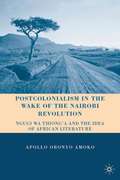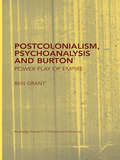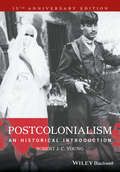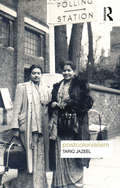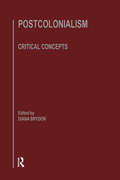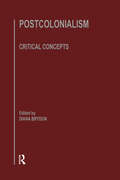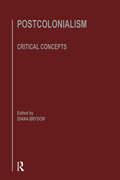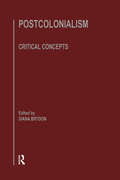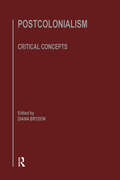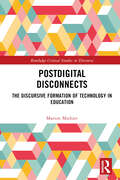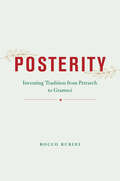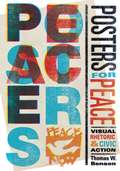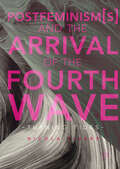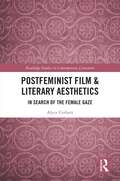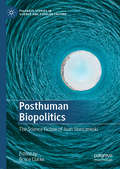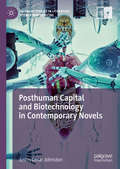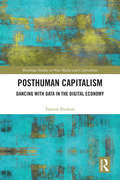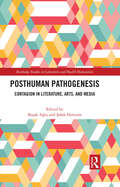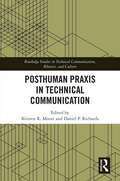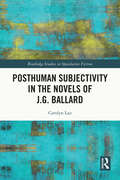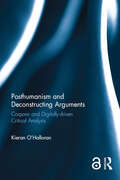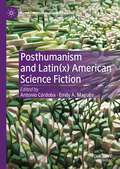- Table View
- List View
Postcolonialism in the Wake of the Nairobi Revolution: Ngugi wa Thiong’o and the Idea of African Literature
by Apollo Obonyo AmokoThis work examines both the emergence of African literature and its institutionalization within nationalist African academies. Amoko analyzes the relationship between such institutions of literature and the processes of nationalist legitimization and between colonial and postcolonial school cultures and national cultures.
Postcolonialism, Psychoanalysis and Burton: Power Play of Empire (Routledge Research in Postcolonial Literatures)
by Ben GrantBy engaging closely with the work of Richard Francis Burton (1821-90), the iconic nineteenth-century imperial spy, explorer, anthropologist and translator, Postcolonialism, Psychoanalysis and Burton explores the White Man’s ‘imperial fantasies’, and the ways in which the many metropolitan discourses to which Burton contributed drew upon and reinforced an intimate connection between fantasy and power in the space of Empire. This original study sheds new light on the mechanisms of imperial appropriation and pays particular attention to Burton’s relationship with his alter ego, Abdullah, the name by which he famously travelled to Mecca and Medina disguised as a Muslim pilgrim. In this context, Grant also provides insightful readings of a number of Burton’s contemporaries, such as Müller, du Chaillu, Darwin and Huxley, and engages with postcolonial and psychoanalytic theory in order to highlight the problematic relationship between the individual and imperialism, and to encourage readers to think about what it means to read colonial history and imperial narrative today.
Postcolonialism: An Historical Introduction (Very Short Introductions Ser.)
by Robert J. YoungThis seminal work—now available in a 15th anniversary edition with a new preface—is a thorough introduction to the historical and theoretical origins of postcolonial theory. Provides a clearly written and wide-ranging account of postcolonialism, empire, imperialism, and colonialism, written by one of the leading scholars on the topic Details the history of anti-colonial movements and their leaders around the world, from Europe and Latin America to Africa and Asia Analyzes the ways in which freedom struggles contributed to postcolonial discourse by producing fundamental ideas about the relationship between non-western and western societies and cultures Offers an engaging yet accessible style that will appeal to scholars as well as introductory students
Postcolonialism: Nature, Environment And The Postcolonial Geographies Of Sri Lankan Nationhood (Key Ideas in Geography #12)
by Tariq JazeelPostcolonialism is a book that examines the influence of postcolonial theory in critical geographical thought and scholarship. Aimed at advanced-level students and researchers, the book is a lively, stimulating and relevant introduction to ‘postcolonial geography’ that elaborates on the critical interventions in social, cultural and political life this important subfield is poised to make. The book is structured around three intersecting parts – Spaces, 'Identity'/hybridity, Knowledge – that broadly follow the trajectory of postcolonial studies since the late 1970s. It comprises ten main chapters, each of which is situated at the intersections of postcolonialism and critical human geography. In doing so, Postcolonialism develops three key arguments. First, that postcolonialism is best conceived as an intellectually creative and practical set of methodologies or approaches for critically engaging existing manifestations of power and exclusion in everyday life and in taken-as-given spaces. Second, that postcolonialism is, at its core, concerned with the politics of representation, both in terms of how people and space are represented, but also the politics surrounding who is able to represent themselves and on what/whose terms. Third, the book argues that postcolonialism itself is an inherently geographical intellectual enterprise, despite its origins in literary theory. In developing these arguments and addressing a series of relevant and international case studies and examples throughout, Postcolonialism not only demonstrates the importance of postcolonial theory to the contemporary critical geographical imagination. It also argues that geographers have much to offer to continued theorizations and workings of postcolonial theory, politics and intellectual debates going forward. This is a book that brings critical analyses of the continued and omnipresent legacies of colonialism and imperialism to the heart of human geography, but also one that returns an avowedly critical geographical disposition to the core of interdisciplinary postcolonial studies.
Postcolonlsm: Critical Concepts Volume 1
by Diana BrydonFirst published in 2004. This is Volume I of Postcolonialism part of a series of critical concepts in literary and cultural studies. This edition includes part one framing the field; part two Marxist, Liberation and Resistance Theory and also part three on Manifestos.
Postcolonlsm: Critical Concepts Volume II
by Brydon DianaFirst published in 2004. This is Volume II of Postcolonialism part of a series of critical concepts in literary and cultural studies. This edition includes part four National, Third World and Postcolonial Identities, part five covering Colonial Discourse Analysis.
Postcolonlsm: Critical Concepts Volume III
by Brydon DianaFirst published in 2004. This is Volume III of Postcolonialism part of a series of critical concepts in literary and cultural studies. This edition includes part six on Orientalisms, part seven on Thinking/Working Through Race and part eight which covers Feminisms and Gender Analysis.
Postcolonlsm: Critical Concepts Volume IV
by Brydon DianaThis is Volume IV of Postcolonialism part of a series of critical concepts in literary and cultural studies. This edition includes Part nine and includes works on internal colonialism and subaltern studies.
Postcolonlsm: Critical Concepts Volume V
by Brydon DianaFirst published in 2004. This is Volume V of Postcolonialism part of a series of critical concepts in literary and cultural studies. This edition includes part eleven on Globalization, Transculturation and Neo-Colonialism; and part twelve on Postcolonial Theory and The Disciplines.
Postdigital Disconnects: The Discursive Formation of Technology in Education (Routledge Critical Studies in Discourse)
by Marion MathierThis book employs a critical discourse ethnographic approach to map the production of social meaning in digital media in education, drawing on insights from Switzerland to unpack the disconnects that arise in thinking postdigitally and ways forward for rethinking socio-cultural approaches. Grounded in Foucault-influenced, linguistically-oriented discourse studies, the book calls attention to the ways in which educational discourse has increasingly promoted digital media as a means of justifying curriculum change. Using data from policy documents, participant observation, and interviews, Mathier charts how this rhetoric manifests itself in the combination of top-down policies, on-the-ground implementation, and the lived experiences of students outside the classroom, and, in turn, surfaces broader disconnects. The volume explores how digital education is increasingly shaped by platform capitalism, how young people’s experiences are disregarded in formal knowledge production, and how the prevalence of digital teaching and learning contributes to issues of access and inequality. Through a critical discursive approach, Mathier demonstrates the need for literacy practices in postdigital education to interrogate the ways in which digital media and education are entangled in larger socio-political practices. This book will appeal to students and scholars in critical discourse studies, critical literacy studies, digital communication, education research, and linguistic ethnography.
Postdigital Disconnects: The Discursive Formation of Technology in Education (Routledge Critical Studies in Discourse)
by Marion MathierThis book employs a critical discourse ethnographic approach to map the production of social meaning in digital media in education, drawing on insights from Switzerland to unpack the disconnects that arise in thinking postdigitally and ways forward for rethinking socio-cultural approaches.Grounded in Foucault-influenced, linguistically-oriented discourse studies, the book calls attention to the ways in which educational discourse has increasingly promoted digital media as a means of justifying curriculum change. Using data from policy documents, participant observation, and interviews, Mathier charts how this rhetoric manifests itself in the combination of top-down policies, on-the-ground implementation, and the lived experiences of students outside the classroom, and, in turn, surfaces broader disconnects. The volume explores how digital education is increasingly shaped by platform capitalism, how young people’s experiences are disregarded in formal knowledge production, and how the prevalence of digital teaching and learning contributes to issues of access and inequality. Through a critical discursive approach, Mathier demonstrates the need for literacy practices in postdigital education to interrogate the ways in which digital media and education are entangled in larger socio-political practices.This book will appeal to students and scholars in critical discourse studies, critical literacy studies, digital communication, education research, and linguistic ethnography.
Posterity: Inventing Tradition from Petrarch to Gramsci
by Rocco RubiniReading a range of Italian works, Rubini considers the active transmittal of traditions through generations of writers and thinkers. Rocco Rubini studies the motives and literary forms in the making of a “tradition,” not understood narrowly, as the conservative, stubborn preservation of received conventions, values, and institutions, but instead as the deliberate effort on the part of writers to transmit a reformulated past across generations. Leveraging Italian thinkers from Petrarch to Gramsci, with stops at prominent humanists in between—including Giambattista Vico, Carlo Goldoni, Francesco De Sanctis, and Benedetto Croce—Rubini gives us an innovative lens through which to view an Italian intellectual tradition that is at once premodern and modern, a legacy that does not depend on a date or a single masterpiece, but instead requires the reader to parse an expanse of writings to uncover deeper transhistorical continuities that span six hundred years. Whether reading work from the fourteenth century, or from the 1930s, Rubini elucidates the interplay of creation and the reception underlying the enactment of tradition, the practice of retrieving and conserving, and the revivification of shared themes and intentions that connect thinkers across time. Building on his award-winning book, The Other Renaissance, this will prove a valuable contribution for intellectual historians, literary scholars, and those invested in the continuing humanist legacy.
Posters for Peace: Visual Rhetoric and Civic Action
by Thomas W. BensonBy the spring of 1970, Americans were frustrated by continuing war in Vietnam and turmoil in the inner cities. Students on American college campuses opposed the war in growing numbers and joined with other citizens in ever-larger public demonstrations against the war. Some politicians—including Ronald Reagan, Spiro Agnew, and Richard Nixon—exploited the situation to cultivate anger against students. At the University of California at Berkeley, student leaders devoted themselves, along with many sympathetic faculty, to studying the war and working for peace. A group of art students designed, produced, and freely distributed thousands of antiwar posters. Posters for Peace tells the story of those posters, bringing to life their rhetorical iconography and restoring them to their place in the history of poster art and political street art. The posters are vivid, simple, direct, ironic, and often graphically beautiful. Thomas Benson shows that the student posters from Berkeley appealed to core patriotic values and to the legitimacy of democratic deliberation in a democracy—even in a time of war.
Posters for Peace: Visual Rhetoric and Civic Action (G - Reference, Information and Interdisciplinary Subjects)
by Thomas W. BensonBy the spring of 1970, Americans were frustrated by continuing war in Vietnam and turmoil in the inner cities. Students on American college campuses opposed the war in growing numbers and joined with other citizens in ever-larger public demonstrations against the war. Some politicians—including Ronald Reagan, Spiro Agnew, and Richard Nixon—exploited the situation to cultivate anger against students. At the University of California at Berkeley, student leaders devoted themselves, along with many sympathetic faculty, to studying the war and working for peace. A group of art students designed, produced, and freely distributed thousands of antiwar posters. Posters for Peace tells the story of those posters, bringing to life their rhetorical iconography and restoring them to their place in the history of poster art and political street art. The posters are vivid, simple, direct, ironic, and often graphically beautiful. Thomas Benson shows that the student posters from Berkeley appealed to core patriotic values and to the legitimacy of democratic deliberation in a democracy—even in a time of war.
Postfeminism(s) and the Arrival of the Fourth Wave: Turning Tides
by Nicola RiversThis book addresses the current resurgence of interest in feminism–notably within popular culture and media–that has led some to announce the arrival of the fourth wave. Research explores where fourth-wave feminism sits in relation to those that preceded it, and in particular, how fourth-wave feminism intersects with differing understandings of postfeminism(s). Through accessible and highly topical examples such as; the controversial actions of activist group, Femen; the rising phenomenon of ‘celebrity feminism;’ or the assumed outdated views of feminists’ associated with previous waves, the relationship between differing concepts of postfeminism(s) is illustrated. By pressing the need for an intergenerational approach to fourth-wave feminism, this book encourages engaging past debates and theorists allowing readers with an interest in the relationship between feminism and popular culture a fuller understanding of feminist theory and providing the opportunity to take stock before diving headfirst into another wave.
Postfeminist Film & Literary Aesthetics: In Search of the Female Gaze (Routledge Studies in Contemporary Literature)
by Alyce CorbettPostfeminist Film & Literary Aesthetics: In Search of the Female Gaze represents a novel and comprehensive study of the aesthetic and affective textual innovations of women in the 21st century from a postfeminist perspective. This book both defines and helps shape the contours of four fast-growing critically and commercially popular modes—millennial film and fiction, metamodernism, an anti-narrative and decorative realm named here as ‘still life’, and new cli-fi—in which there is no clear male equivalent or in which women’s work can be read as a distinct aesthetic force. As the textual constellation of now is being mapped and its key texts being canonised, this book contributes to the current recentring of aesthetic taste that is occurring in literature, film, and surrounding criticism, making greater space for the appreciation of female aesthetics and for future inquiries in this field.
Posthuman Biopolitics: The Science Fiction of Joan Slonczewski (Palgrave Studies in Science and Popular Culture)
by Bruce ClarkeThis volume presents the first collection of essays dedicated to the science fiction of microbiologist Joan Slonczewski. Posthuman Biopolitics consolidates the scholarly literature on Slonczewski’s fiction and demonstrates fruitful lines of engagement for the critical, cultural, and theoretical treatment of her characters, plots, and storyworlds. Her novels treat feminism in relation to scientific practice, resistance to domination, pacifism versus militarism, the extension of human rights to nonhuman and posthuman actors, biopolitics and posthuman ethics, and symbiosis and communication across planetary scales. Posthuman Biopolitics explores the breadth and depth of Joan Slonczewski’s vision, uncovering the reflective ethical practice that informs her science fiction.
Posthuman Capital and Biotechnology in Contemporary Novels (Palgrave Studies in Literature, Science and Medicine)
by Justin Omar JohnstonThis book examines several distinctive literary figurations of posthuman embodiment as they proliferate across a range of internationally acclaimed contemporary novels: clones in Kazuo Ishiguro’s Never Let Me Go, animal-human hybrids in Margaret Atwood’s Oryx and Crake, toxic bodies in Indra Sinha’s Animal’s People, and cyborgs in Jeanette Winterson’s The Stone Gods. While these works explore the transformational power of the “biotech century,” they also foreground the key role human capital theory has played in framing human belonging as an aspirational category that is always and structurally just out of reach, making contemporary subjects never-human-enough. In these novels, the dystopian character of human capital theory is linked to fantasies of apocalyptic release. As such, these novels help expose how two interconnected genres of futurity (the dystopian and the apocalyptic) work in tandem to propel each other forward so that fears of global disaster become alibis for dystopian control, which, in turn, becomes the predicate for intensifying catastrophes. In analyzing these novels, Justin Omar Johnston draws attention to the entanglement of bodies in technological environments, economic networks, and deteriorating ecological settings.
Posthuman Capitalism: Dancing with Data in the Digital Economy (Routledge Studies in New Media and Cyberculture)
by Yasmin IbrahimPosthuman Capitalism critically reviews the manifestation of capitalist agenda online by examining the phenomenon of the ‘posthuman’ in the data economy. The chapters examine our posthuman condition, where we are constantly asked to partake in platforms which perform to capitalist agenda while socializing us into new platforms of living, consuming and interacting online. Labelling these modes of our experiential extractions, transactions and re-making of our mortal lives as posthuman capitalism, the book reviews the human entanglements from sociality, friendship, desire, memory, transgressions of privacy and co-production of value through the data economy. Offering innovative and interdisciplinary conceptualisations and vantage points on our contemporary data society, this book will be a key text for scholars and students in the areas of digital media, communication studies, sociology, philosophy and social psychology.
Posthuman Pathogenesis: Contagion in Literature, Arts, and Media (Routledge Studies in Literature and Health Humanities)
by Başak AğınThis multi-vocal assemblage of literary and cultural responses to contagions provides insights into the companionship of posthumanities, environmental humanities, and medical humanities to shed light on how we deal with complex issues like communicable diseases in contemporary times. Examining imaginary and real contagions, ranging from Jeep and SHEVA to plague, HIV/AIDS, and COVID-19, Posthuman Pathogenesis discusses the inextricable links between nature and culture, matter and meaning-making practices, and the human and the nonhuman. Dissecting pathogenic nonhuman bodies in their interactions with their human counterparts and the environment, the authors of this volume raise their diverse voices with two primary aims: to analyse how contagions trigger a drive to survival, and chaotic, liberating, and captivating impulses, and to focus on the viral interpolations in socio-political and environmental systems as a meeting point of science, technology, and fiction, blending social reality and myth. Following the premises of the post-qualitative turn and presenting a differentiated experience of contagion, this ‘rhizomatic’ compilation thus offers a non-hierarchised array of essays, composed of a multiplicity of genders, geographies, and generations.
Posthuman Praxis in Technical Communication (Routledge Studies in Technical Communication, Rhetoric, and Culture)
by Kristen R. Moore Daniel P. RichardsThis collection, aimed at scholars, teachers, and practitioners in technical communication, focuses on the praxis-based connections between technical communication and theoretical movements that have emerged in the past several decades, namely new materialism and posthumanism. It provides a much needed link between contemporary theoretical discussions about new materialisms and posthumanism and the practical, everyday work of technical communicators. The collection insists that where some theoretical perspectives fall flat for practitioners, posthumanism and new materialisms have the potential to enable more effective and comprehensive practices, methodologies, and pedagogies.
Posthuman Subjectivity in the Novels of J.G. Ballard (Routledge Studies in Speculative Fiction)
by Carolyn LauThis book proposes that Ballard’s novels extrapolate the formation of a posthuman subjectivity that is centred around an affirmative understanding of what a human body can do. This new subjectivity transforms constraints and prescribed desires into creative openings in a hyper-mediated control society that conditions docile bodies through technology and consumerism. Set in surrealist predicaments in postwar affluent Western societies, Ballard’s novels remind us of the fragile veneer of order in the familiar every day. In these moments of crisis, complacent characters are compelled to undergo a process of defamiliarisation and transformation of their understanding of the self and the body. The ability to form new relationships with the unfamiliar is imperative to survival in a hostile environment. Ballard delineates both the possibilities and obstacles of forming these relationships. In particular, the author attributes the failure to do so to the irreconcilable contradictions of late capitalism.
Posthuman Subjectivity in the Novels of J.G. Ballard (Routledge Studies in Speculative Fiction)
by Carolyn LauThis book proposes that Ballard’s novels extrapolate the formation of a posthuman subjectivity that is centred around an affirmative understanding of what a human body can do. This new subjectivity transforms constraints and prescribed desires into creative openings in a hyper-mediated control society that conditions docile bodies through technology and consumerism. Set in surrealist predicaments in postwar affluent Western societies, Ballard’s novels remind us of the fragile veneer of order in the familiar every day. In these moments of crisis, complacent characters are compelled to undergo a process of defamiliarisation and transformation of their understanding of the self and the body. The ability to form new relationships with the unfamiliar is imperative to survival in a hostile environment. Ballard delineates both the possibilities and obstacles of forming these relationships. In particular, the author attributes the failure to do so to the irreconcilable contradictions of late capitalism.
Posthumanism and Deconstructing Arguments: Corpora and Digitally-driven Critical Analysis
by Kieran O'HalloranPosthumanism and Deconstructing Arguments: Corpora and Digitally-driven Critical Analysis presents a new and practical approach in Critical Discourse Studies. Providing a data-driven and ethically-based method for the examination of arguments in the public sphere, this ground-breaking book: Highlights how the reader can evaluate arguments from points of view other than their own; Demonstrates how digital tools can be used to generate ‘ethical subjectivities’ from large numbers of dissenting voices on the world-wide-web; Draws on ideas from posthumanist philosophy as well as from Jacques Derrida, Gilles Deleuze and Félix Guattari for theorising these subjectivities; Showcases a critical deconstructive approach, using different corpus linguistic programs such as AntConc, WMatrix and Sketchengine. Posthumanism and Deconstructing Arguments is essential reading for lecturers and researchers with an interest in critical discourse studies, critical thinking, corpus linguistics and digital humanities.
Posthumanism and Latin (Studies in Global Science Fiction)
by Emily A. Maguire Antonio CórdobaThis volume explores how Latin American and Latinx creators have engaged science fiction to explore posthumanist thought. Contributors reflect on how Latin American and Latinx speculative art conceptualizes the operations of other, non-human forms of agency, and engages in environmentalist theory in ways that are estranging and open to new forms of species companionship. Essays cover literature, film, TV shows, and music, grouped in three sections: “Posthumanist Subjects” examines Latin(x) American iterations of some of the most common figurations of the posthuman, such as the cyborg and virtual environments and selves; “Slow Violence and Environmental Threats” understands that posthumanist meditations in the hemisphere take place in a material and cultural context shaped by the catastrophic destruction of the environment; the chapters in “Posthumanist Others” shows how the reimagination of the self and the world that posthumanism offers may be an opportunity to break the hold that oppressive systems have over the ways in which societies are constructed and governed.
